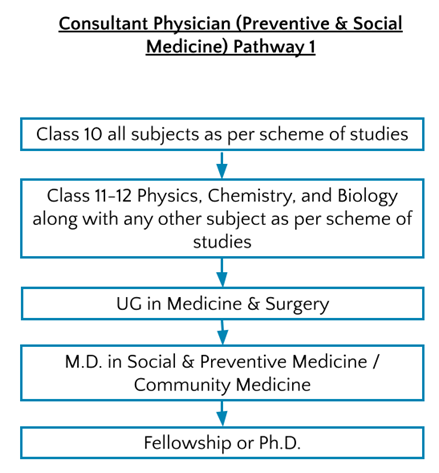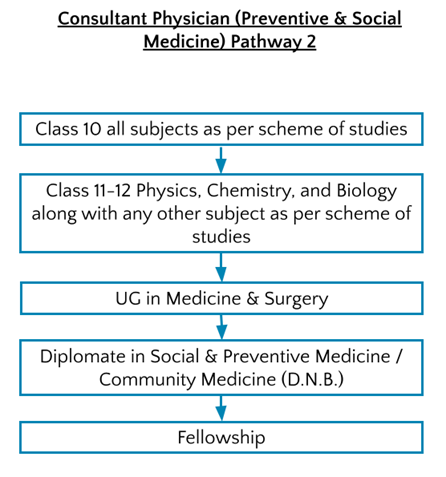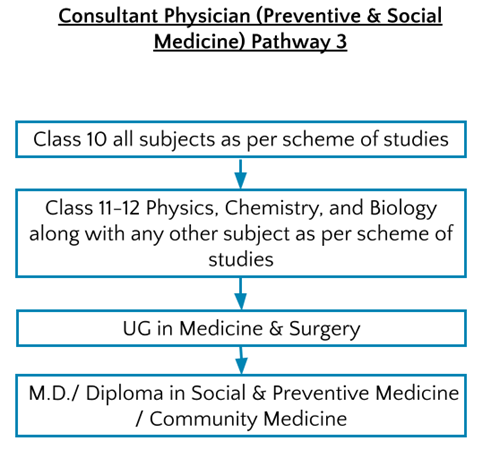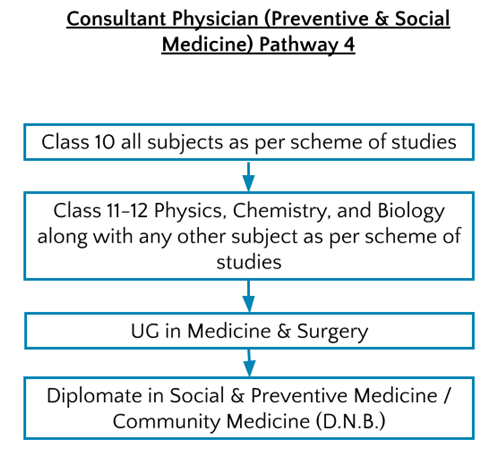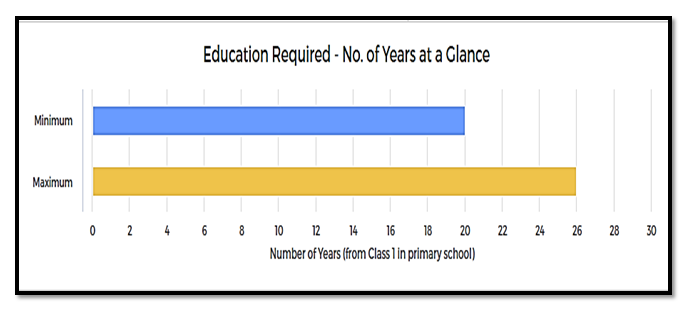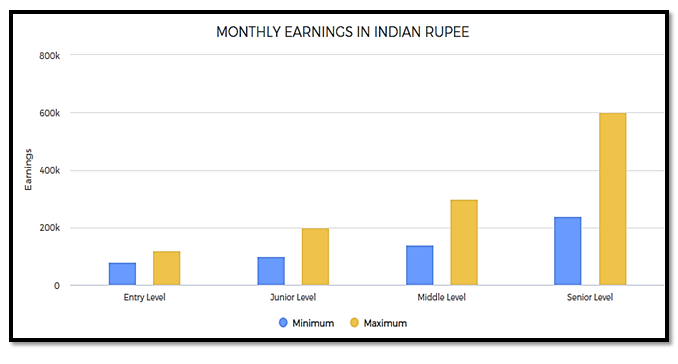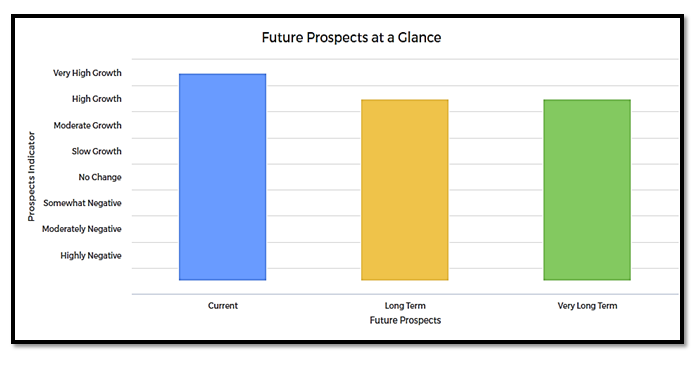Consultant Physician (Preventive & Social Medicine)
Entry Level Qualification
12
Career Fields
Medical Services
For Specially Abled






Career Entrance Exam
About Career
`1. Consultant Physician (Preventive & Social Medicine) is a specialist who works to promote personal and community healthcare and attempt to prevent the spread of diseases among the members of a community.
2. As a physician (social & preventive medicine), you will be offering medical services that would range from preventive and curative to rehabilitative. As a social and preventive medicine physician, you would primarily aim to protect, promote and maintain the health and well-being and to prevent people from disease, injuries and death.
3. As a consultant Physician (Preventive & Social Medicine) you will work to ensure that people follow healthy and hygienic habits as well as take proper care of health so as to ensure that people don’t suffer from diseases, contagious diseases do not spread to turn into an epidemic or pandemic. They also work to help people take measures for preventing the onset of endemic diseases such as malaria. Overall, you will wish to improve the health of the population that you are working for through preventive measures rather than treatment.
Key roles and responsibilities
As a Consultant Physician (Preventive & Social Medicine), you will have different roles and responsibilities based on your speciality and super speciality. Following is the list of few roles and responsibilities across the specialities:
1. You will lead, direct or manage several prevention programmes in speciality areas like aerospace, occupational, infectious diseases, environmental medicine, etc.
2. You will work to identify different groups that are at risks from specific preventable diseases or injuries.
3. You will work on public health education programmes by dealing with topics such as preventable diseases, injuries, nutrition, food service sanitation, water supply safety, sewage and waste disposal, insect control, and immunizations.
4. You will supervise or coordinate with other doctors, physicians, surgeons, nurses, health care assistants, statisticians, and other health professionals.
5. You will work to evaluate the effectiveness of methods and interventions used to reduce health risks.
PARTICULARS | DESCRIPTION |
Name | Consultant Physician (Preventive & Social Medicine) |
Purpose | Addressing Public Health Issues |
Career Field | Allied & Para Medical Science |
Required Entrance Exam | NEET PG, AIIMS PG INICET |
Average Salary | 12,00,000 - 14,00,000 Rs. Per Year |
Companies For You | AIIMS, Railway Hospitals, Private Hospitals & Many More |
Who is Eligible | Post Graduate |
Career Entry Pathway
Class 10 all subjects as per scheme of studies – Class 11-12 Physics, Chemistry, and Biology along with any other subject as per scheme of studies – UG in Medicine & Surgery – M.D. in Social & Preventive Medicine / Community Medicine – Fellowship or Ph.D.
After your Class 10 all subjects as per scheme of studies pursue Class 11-12 Physics, Chemistry, and Biology along with any other subject as per scheme of studies and then study for an undergraduate degree in Medicine & Surgery followed by an M.D. specialty in Social & Preventive Medicine / Community Medicine. After M.D., you can take a fellowship or Ph.D.
Class 10 all subjects as per scheme of studies – Class 11-12 Physics, Chemistry, and Biology along with any other subject as per scheme of studies – Class 11-12 in Science stream in Physics, Chemistry and Biology – UG in Medicine & Surgery – Diplomate in Social & Preventive Medicine / Community Medicine (D.N.B.) – Fellowship
After your Class 10 all subjects as per scheme of studies pursue Class 11-12 Physics, Chemistry, and Biology along with any other subject as per scheme of studies and then study for an undergraduate degree in Medicine & Surgery followed by a Diplomate in Social & Preventive Medicine / Community Medicine (D.N.B.). After a Diplomate, you can take a fellowship or Ph.D.
Class 10 all subjects as per scheme of studies – Class 11-12 Physics, Chemistry, and Biology along with any other subject as per scheme of studies – UG in Medicine & Surgery – M.D./ Diploma in Social & Preventive Medicine / Community Medicine
After your Class 10 all subjects as per scheme of studies pursue Class 11-12 Physics, Chemistry, and Biology along with any other subject as per scheme of studies and then study for an undergraduate degree in Medicine & Surgery followed by an M.D. or Diploma in Social & Preventive Medicine / Community Medicine.
Class 10 all subjects as per scheme of studies – Class 11-12 Physics, Chemistry, and Biology along with any other subject as per scheme of studies – UG in Medicine & Surgery – Diplomate in Social & Preventive Medicine / Community Medicine (D.N.B.)
After your Class 10 all subjects as per scheme of studies pursue Class 11-12 Physics, Chemistry, and Biology along with any other subject as per scheme of studies and then study for an undergraduate degree in Medicine & Surgery followed by a Diplomate in Social & Preventive Medicine / Community Medicine (D.N.B.)
Required Qualification & Competencies
After your MBBS, you should an MD/MS in Preventive & Social Medicine / Family Medicine /Community Medicine. Alternatively, after MBBS, you can also do a DNB (Diplomate of National Board) program which is equivalent to an MD.
MINIMUM EDUCATION REQUIRED | MAXIMUM EDUCATION REQUIRED |
Doctoral All Ph.D. or equivalent degree programs for which the minimum eligibility is a Postgraduate or a Pre-Doctoral degree. | Post-Doctoral Post Ph.D. programs for which the minimum eligibility is a Doctoral degree. |
Competencies Required
Interests
1. Investigative: You should have interests for Investigative Occupations. Investigative occupations involve working with ideas and quite a lot of thinking, often abstract or conceptual thinking. These involve learning about facts and figures; involve use of data analysis, assessment of situations, decision making and problem solving.
2. Realistic: You should have interests for Realistic Occupations. Realistic occupations involve more practical and hands-on activities than paperwork or office work. Realistic occupations often involve physical activities for getting things done using various tools and equipment.
3. Social: You should have interests for Social Occupations. Social occupations involve helping or assisting others; these involve working with and communicating with people to provide various services; these may involve educating and advising others.
Abilities
1. Abstract Reasoning: The ability to understand ideas which are not expressed in words or numbers; the ability to understand concepts which are not clearly expressed verbally or otherwise.
2. Arm-Hand Steadiness: The ability to keep your hand and arm steady while moving your arm or while holding your arm and hand in one position.
3. Deductive Reasoning: The ability to apply general rules and common logic to specific problems to produce answers that are logical and make sense. For example, understanding the reasons behind an event or a situation using general rules and common logic.
4. Emotional Intelligence: The ability to understand your own and others' emotions and feelings; empathy for others; adjusting your behaviour or self-control and self-regulation according to others' emptions and situations.
5. Finger Dexterity: The ability to make precisely coordinated movements of the fingers of one or both hands to grasp, manipulate, or assemble very small objects.
6. Flexibility of Closure: The ability to identify or detect a pattern (a figure, object, word, or sound) that is hidden among other distracting materials.
7. Hand-Eye Coordination: The ability to make quick and precise hand movements as per visual observations and understanding (that is, what you see and comprehend).
8. Inductive Reasoning: The ability to combine pieces of information from various sources, concepts, and theories to form general rules or conclusions. For example, analysing various events or situations to come out with a set of rules or conclusions.
9. Inter-Personal: The ability to build and maintain good relationships with others at workplaces and elsewhere.
10. Mental Stamina: The ability to sustain prolonged mental effort.
11. Oral Comprehension: The ability to listen to and understand information and ideas presented through spoken words and sentences.
12. Oral Expression: The ability to communicate information and ideas in speaking so others will understand.
13. Problem Sensitivity: The ability to tell when something is wrong or is likely to go wrong. It does not involve solving the problem, only recognizing there is a problem.
14. Selective Attention: The ability to concentrate on a task over a long period of time without being distracted.
15. Verbal Reasoning: The ability to think and reason with words; the ability to reason out ideas expressed in words.
16. Written Comprehension: The ability to read and understand information and ideas presented in writing.
Knowledge
1. Biological Sciences: Knowledge of plants and animals, their anatomical structure, cell structure, tissues, physiological functions, evolution, and all other related aspects.
2. English Language: Knowledge about English grammar, words, spelling, sentence construction, using English to communicate with others, reading in English, etc.
3. Medicine: Knowledge of the science of diagnosis, treatment and prevention of human diseases, ailment, injuries and disorders. This includes understanding the symptoms, knowledge of the diagnostic processes, knowledge of the treatment procedures and medicines, and preventive healthcare measures.
Skills
1. Active Learning: Focused and continuous learning from various sources of information, observation and otherwise for application in getting work done.
2. Active Listening: Giving full attention to what other people are saying, understanding the points being made by others, asking questions, etc.
3. Communication in English: Skills in communicating effectively in writing as well as verbally with others in English language.
4. Critical Thinking: Skills in analysis of complex situations, using of logic and reasoning to understand the situations and take appropriate actions or make interpretations and inferences.
5. Judgment and Decision Making: Skills in considering pros and cons of various decision alternatives; considering costs and benefits; taking appropriate and suitable decisions.
6. Problem Solving: Skills in analysis and understanding of problems, evaluating various options to solve the problems and using the best option to solve the problems.
7. Reading Comprehension: Skills in understanding written sentences and paragraphs in work related documents.
8. Scientific: Skills in using various scientific rules and methods to get things done or solve problems.
9. Service Orientation: Skills in or keen interest to help and assist people.
Personality
1. You are always or mostly organised in your day-to-day life and activities.
2. You are always or mostly disciplined in your action and behaviour.
3. You are always or mostly a soft-hearted person.
4. You are always or mostly helpful to others.
5. You are always calm or generally remain calm in most situations.
6. You always feel secure in your surroundings and in most situations.
7. You can always act independently or could do so in most situations.
8. You are always or mostly caring, supportive, sympathetic and kind to others.
Career - Job Opportunities & Profiles
1. After M.D., you can join a medical college like AIIMS, Railway hospitals, private hospitals, government hospitals etc. as a senior resident doctor.
2. You can join hospitals, clinics, railway hospitals, emergency medical centres, etc. as Consultant Physician (Medical Officer).
3. You can join as an assistant Project officer/ manager with several public health organizations like the Public Health Foundation of India.
4. You can join as a research assistant after Post Graduation or as a Junior Research fellow after Ph.D. Most of the medical college provides opportunities as a Junior Research Fellow.
5. You can also join the medical college at the rank of Assistant Professor.
Work Environment
You would be required to spend most of the time in the field or in the hospital. If you are working in the field, you will visit homes, villages, communities of people affected by different diseases. You will have flexible working timings with many times working overtime. If you are in the hospital, you will have fixed office timing. However, you will be required to constantly be up to dealing patients, meeting their family members, solving their problems, assisting them. If can be a challenging role as many times people are in a hurry, stress, and worry.
Specialisation Tracks In This Career
1. Physician (Community Medicine)
Physician (Community medicine) is a specialist who works for the health and betterment of members of any, particularly community, municipality or region. A physician (community medicine) understand the health needs of the community and carry out health care within the framework of national health policies. You will be an expert of health planning, management and education for community or social group.
2. Physician (Family Medicine)
Physician (Family medicine) is a specialist who is devoted to the healthcare of all ages. Generally, they are also known as a family doctor or family physician. As a physician (family medicine) you will be providing primary care of the individual or family across all ages., genders, diseases and parts of the body. You will be emphasizing on continual health care, health promotion, diagnosing the disease based on family history, etc.
Career Growth
1. The career growth in university and college states from Assistant Professor and then Associate Professor, Professor and Professor Emeritus. Professors can also get administrative positions such as Director/Dean/Vice Chancellor, etc
2. If you are hired as a junior resident, then you will move to senior resident and then either you can choose to be a fellow or join any hospital as a Medical officer (Physician) or Consultant Physician.
3. If you Join as a Consultant Physician (Medical Officer), then you will go on to become Deputy Medical Superintendent and then Additional Medical Superintendent and then Medical Superintendent. You might also become director of the Hospital.
Salary Offered
After completing M.D. / D.N.B. course:
1. At the entry level, one joins as a Consultant Physician and earn about Rs. 80,000 – 1, 20,000 a month. With experience, their salary increases.
2. At the junior level with a work experience of 5-6 years, you would be earning anything between Rs. 1, 00,000 to 2, 00,000 per month.
3. At the middle level with an experience of 8-12 years, you would be earning anything between Rs. 1, 40,000 to 3, 00,000 per month.
4. At the senior level of over 12 years of work experience, you would be earning anything between Rs. 2, 40,000 to 6, 00,000 per month or even more.
Monthly Earning In Indian Rupee
Entry Level | Junior Level | Mid-Level | Senior Level | |||||
Min Earning | Max Earning | Min Earning | Max Earning | Min Earning | Max Earning | Min Earning | Max Earning | |
80000 | 120000 | 100000 | 200000 | 140000 | 300000 | 240000 | 600000 | |
1. Entry level: 0 - 2 years of work experience
2. Junior Level: From 1 to 12 years of work experience
3. Mid-Level: From 5 to 20+ years of work experience
4. Senior Level: From 10 to 25+ years of work experience (there could be exceptions in some high-end technical, financial, engineering, creative, management, sports, and other careers; also in the near future, people will reach these levels much faster in many careers and in some careers, these levels will have no meaning as those careers will be completely tech skill driven such as even now, there is almost no level in a Cyber Security Expert’s job)
Work Activities
1. Analyzing and interpreting data and information: Analysis of data and information to find facts, trends, reasons behind situations, etc.; interpretation of data to aid in decision making.
2. Assisting and caring for people: Assisting people in availing of services; taking care of people in different situations; offering help and services to others.
3. Communicating with co-workers and others: Communicating with people in writing, verbally or otherwise inside your workplace and various other people who have professional relationships with your place of work including vendors, government officials, etc. or with people at large.
4. Decision making and problem solving: Analysis of data and information; evaluation of alternative decisions and results of decisions; taking the right decisions and solving problems.
5. Getting Information and learning: Observing, hearing, reading, using computers, or otherwise obtaining information and learning from it.
6. Identifying objects, actions, and events: Identifying various characteristics of objects; observing and understanding actions and events; understanding changes in actions and events.
7. Inspecting situations, events, and people: Inspecting situations, events and people to understand the reasons and causes for the situation or events to happen; inspecting people to understand reasons behind their behavior and actions.
8. Organizing, planning and prioritizing tasks: Planning and organizing tasks in order to achieve work goals; prioritising tasks to achieve goals and making the best use of the time available.
9. Providing advices and consultation to others: Giving advices or consultation to others about various issues, conceptual matters, know-hows, scientific matters, products or services.
10. Updating and using relevant knowledge: Keeping updated with the latest knowledge relevant to your fields of work and use of the relevant knowledge in getting things done.
11. Using computers for work: Using computers for day-to-day office work; using computer software for various applications in day-to-day professional work; entering data and process information; for writing.
12. Working directly with people: Working directly with people to offer them products and services, providing assistance, etc.
13. Working in a team: Working in a team of people; developing team; maintaining professional relationships among team members.
Future Prospects
Indian Medical industry is growing exponentially riding on strong demand due to rising incomes, greater health awareness and increase in access to insurance. It might grow to 373 Billion USD as per a report by ibef.org. Also, with the introduction of Ayushman Bharat, Insurance and medical benefit aregiven by Government of India, more and more people will start using medical facilities. All these numbers indicate a bright future for Consultant Physicians (Preventive & Social Medicine).
Future Prospects At A Glance
Current (0-1 year) | Long Term (2-5 year) | Very Long Term (6-10 years) |
Very High Growth | High Growth | High Growth |

